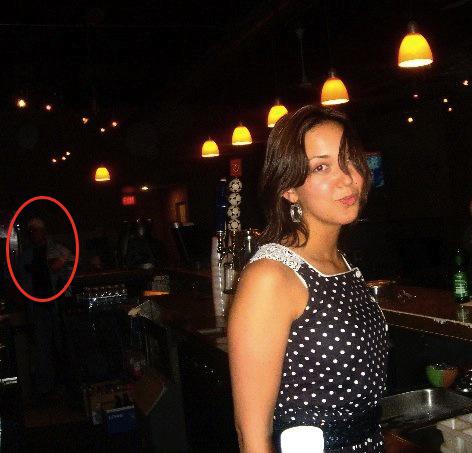Like this article? rabble is reader-supported journalism. Chip in to keep stories like these coming.
Jian Ghomeshi goes to trial this month. And so, in a way, do Canadian women. This trial is not only about a man who violated the four women pressing charges, but about whether we, as a society, trust women who tell.
It’s personal for me. Today and every day of February, I am sharing my own stories of sexual harassment and violence. Today is day five, in which I share my experience being grabbed and kissed on the neck at the bar I was working at and the challenge of naming this incident sexual assault. If you’re joining us now, may I suggest that you start at the beginning, by reading my introduction here. And remember, practice self-care. The Ghomeshi scandal has one hell of an undertow.
This is incident number 36.
I was 21, had graduated from university, and was bartending at a social club in Corso Italia, Toronto. Italian-Torontonian culture is specific and robust and I cannot do it justice in this short blog post. It has maintained its own language through three or four immigrant generations, evolving a set of linguistic rules so structured that it is now considered its own dialect. It has specific cultural constraints, prohibitions and enthusiasms. Gender roles are complex in ways that I never, in my six years in Toronto, entirely grasped.
Being a female bartender in a social club (an otherwise all-male establishment) was a fascinating experience. Most of the clientele had known each other since high school. In Grade 10, they had frequented the establishment to play video games and drink soda; they were now drinking espresso and gambling or watching sports games in it at age 30. Working there was like being parachuted into a new world.
Most of the customers were unmarried, living with their parents. They came to the bar to fill their social lives and to flirt with the bartenders. There were sweet moments and some genuinely kind people. They tried on my jackets and scarves, dressing up like children and allowing me to take hilarious photos. There were moments of toxic masculinity and some genuinely troubled souls. They liked it when women appeared to be knocked unconscious on WWE. When Anna Nicole Smith died, a customer told me he would happily fornicate with her corpse.
We had little to do at the bar when there wasn’t a sports show on. I enjoyed making espresso and wise-cracks, learning about their lives and trying to propel otherwise cranky men into treating me with grudging affection; I didn’t know it then, but this was an excellent preparation for talk radio. Whenever a man got married, he moved in with his wife and almost entirely absented himself from the bar. As one employee told me, “When you’re working at the bar, you’re everyone’s girlfriend.”

Because I kept my tips and belongings behind the long granit counter-top bar that ran almost the entire length of the establishment, no one was supposed to come behind it but the owner and other employees. When the owners weren’t around, however, this rule could only loosely be enforced. As a woman, I didn’t occupy a position of authority in that social space. I had no means of stopping anything from happening; no means of making someone pay their tab, put out their cigarette, or change their behavior. The best I could do was to appeal to a man’s sense of chivalry.
Which is how a man could step behind the bar…

Walk all the way up it, and grab me as he posed for a photo, using it as an excuse to kiss me on the neck.

This incident wasn’t entirely out of the blue. I knew the man a little. He was sweet to me at work and I had run into him once on St. Clair West, when he introduced me to another female friend. He had told me about his girlfriend, whom he was planning to marry. How she was no fun and would patrol the street checking to see if his car was parked there or at his parents’ house.
He told me once that he liked to pull her hair, because she didn’t like it. He said that they spent little time together but that when they did he demanded sex right away, and that she acquiesced because she knew that he would be in a bad mood until she did. He said she tolerated violence during sex only to make him happy.
When I realized he was walking up behind the bar, I thought we would pose for a photo together, maybe our arms around each other’s shoulders. Like friends, and like many other photos I have from that time. I was taken by surprise when he grabbed me, wrapping his arms around me, and kissed my cheek. I was not happy.
You can see in the photo, however, that I kept my smile. Because, as Lucy Decoutere spoke about on the stand yesterday, women often take on the emotional labour of keeping an inappropriate situation pleasant, even when they are the victim of an attack. I kept harmony in the bar. It was all part of my job.
And I quit it just a few days later. Not because of the incident but because many things had changed for me that day. I had gone on a first date with a man I really liked (another customer). Once it was known that I was “his” girl, my position at the bar changed. I was treated then with both more respect and with some coldness. Grabbing and kissing another man’s woman—that was just not right.
* * *
I want to talk about two things in relation to this incident. The first is what it means to call a kiss a sexual assault; the second is the process through whicih a photograph can become an opportunity for exploitation.
I hadn’t considered this incident sexual assault until reading a Jezebel article in 2012, which referenced a post on Crates and Ribbons in which the famous photo of a soldier forcefully open-mouthed kissing a nurse on V-Day is presented as visible evidence of a sexual assault. The fact that a kiss could be considered sexual assault should not have been new to me. Sexual knowledge of another person without their consent is a violation. Sexual touching of another person without their consent is assault. But to actually have someone put it out there and call it like it is… it blew my mind.
And it hurt. It was painful to me to begin to think about the difficult incidents of my life through this lens. Sexual assault? Sexual assault. It’s a big thing to lay claim to. In calling a kiss sexual assault, I ask the outside world to match up its understanding of romance with what I know of my own experience. In the best scenarios, it re-frames me from “normal” human being to sexual assault survivor. An identity new and unusual, and not always positive.
Then, in August 2015, journalist Megan Batchelor was kissed on camera while reporting from a music festival. And she, like a total badass, REPORTED IT TO THE RCMP. This marked a turning point for Canada, or at least for Canadian media. We now inhabit a world where a man can’t just run up to a woman and kiss her without her consent, expecting her to simply laugh it off. Now, it is not only ungentlemanly—which, let’s be honest, has never stopped anyone—but carries severe legal and social consequences. The only things that ever have stopped anyone.
About photographs and vulnerability to assault: my first story for this project was about a man who took advantage of a photo being taken of a 10 year-old to display his erection. The story I relate today, which occurred 3,000 miles away and a decade later, has some similarities. A third story, which I plan to publish on February 21, also shares this trope. What gives? What makes casual photography an opportunity for violation?
The pretext is a harmless performance of affection (let’s pose like we’re having fun!), but the actions are physical and real (now I’m kissing you!). As a society, we now believe that we should show happiness and intimacy in photos. This wasn’t always the case, and you can listen to a fascinating Spark CBC episode about that evolution of facial expressions in photography.
When someone puts their arm around another it is a signal to the watching world (now, mostly social media) that they have a positive relationship with that person; that the other is, if not kin, definitely kith. Just earlier this week, Kim Kardashian and Amber Rose had “tea” and posed for a photo together as a way to tell the world that they rise above the drama of their menfolk (and are still really hot).
It’s what makes this photo, which I took with a stranger at a friend’s show, so funny. I’ve been wondering who he is since 2007.

If a woman refuses to perform happiness with a man for a photograph, she is in effect rejecting him. Few people are willing to refrain from shaking the outstretched hand of another, and rejecting a happily posed shared photo sends a similar social message. It is, however, comparatively easy to simply pose for a fun photo. We (supposedly) lose little by doing it.
Men know that women are vulnerable in this position and are unlikely to say no when asked. Some (not all men!) take advantage of that moment to behave inappropriately. To assault women. For those men, photographic evidence of their assault is photographic evidence of a conquest.
Tomorrow, a customer gropes me and shows me his boner—ahem, bone carving. Whale bone carving. No, really. Really.
Like this article? rabble is reader-supported journalism. Chip in to keep stories like these coming.


